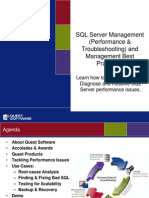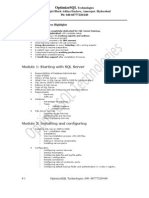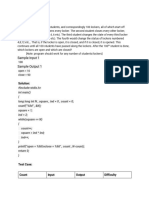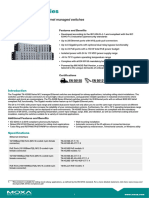SQL Server Performance Tuning and Optimization
Uploaded by
Siddiqui SarfarazSQL Server Performance Tuning and Optimization
Uploaded by
Siddiqui SarfarazCOURSE: SQL Server Performance Tuning And Optimization
This Masterclass suits Database
Summary
administrators who are responsible for the
Duration: 5 days/ 40 hours
proper and reliable operation of one or
Level: 400*
more SQL Servers. It also suits to Database
Delivery method: In class
Developers who want to know how to
Language: English/Bulgarian
optimize their code or to isolate * The difficulty level is consistent with the widely accepted scale of technical difficulty of
performance issues in the data access layer. training on Microsoft Corp
Participants will learn how to search and
detect problems raising in SQL database, the QP and code Execution. This class includes solid theoretical
material, part of which comes directly from the programme team, who develops SQL Server in Microsoft, and
unpublished tuning techniques for increasing of SQL Server performance.
AUDIENCE:
Database administrators who are responsible for the proper and reliable operation of one or more SQL
Servers
Developers who want to create a good and scalable code by understanding how the internal processes, the
QP and code execution work
SQL Server architects and professionals who want to be successful in performance tuning of SQL Server
environments, to empower themselves with knowledge, skills and methodology for finding, isolating and
troubleshooting performance problems
AFTER THE TRAINING ATTENDEES WILL BE ABLE TO:
Find performance problems in SQL Server workload and tune them properly
Know monitoring and profiling tools that SQL Server provides out of the box
Choose the right tool in order to get the right monitoring data for fast problem detection
Have a deep understanding of the architecture and the way SQL Server works in order to reach the
problem root cause and to act properly
Configure SQL Server at all levels in order to avoid and reduce problems
Get to the problem quickly in order to reduce the downtime in production environment
Develop SQL code that is aligned to good coding practices and provides scalability and performance of the
database access layer
Avoid traps in code development and object usage
Find/assess code that performs badly and to know how to optimize it
TOPICS:
Module 1. SQL Server Internals and Resource Management
Module 2. Waits and Queues Methodology for PTO
Module 3. TempDB and Database level PTO
Module 4. Event-based Monitoring and PTO Scenarios
Module 5. Query Execution and Query plans
Module 6. The importance of statistics and indexes
Module 7. Query Tuning when indexes cannot help
Module 8. Optimizing Large Tables Performance
Module 9. Tools for analysing performance problems
You might also like
- D9102 User Manual: 1. USB Interface 2. SIM Card 3. Modem Cap 4. Guide Light 5. Cover of SIM Card100% (1)D9102 User Manual: 1. USB Interface 2. SIM Card 3. Modem Cap 4. Guide Light 5. Cover of SIM Card5 pages
- Victoria II Heart of Darkness - Manual PDFNo ratings yetVictoria II Heart of Darkness - Manual PDF28 pages
- SQL Server:: Performance Tuning and OptimizationNo ratings yetSQL Server:: Performance Tuning and Optimization2 pages
- SQL Server Performance Tuning - Fast Track: Course TitleNo ratings yetSQL Server Performance Tuning - Fast Track: Course Title8 pages
- SQL Server Performance Tuning and Optimization ClinicNo ratings yetSQL Server Performance Tuning and Optimization Clinic2 pages
- SQL Server Query Optimization - Key PointsNo ratings yetSQL Server Query Optimization - Key Points5 pages
- 10987C - Performance Tuning and Optimising SQL DatabasesNo ratings yet10987C - Performance Tuning and Optimising SQL Databases4 pages
- WorkshopPLUS SQLServer2014 PerformanceTuningandOptimizationNo ratings yetWorkshopPLUS SQLServer2014 PerformanceTuningandOptimization2 pages
- SQL Server 2012 Performance Tuning Design Internals and Architecture Workshop (4 Days)No ratings yetSQL Server 2012 Performance Tuning Design Internals and Architecture Workshop (4 Days)3 pages
- Mastering the Art of PL/SQL Programming: Unraveling the Secrets of Expert-Level ProgrammingFrom EverandMastering the Art of PL/SQL Programming: Unraveling the Secrets of Expert-Level ProgrammingNo ratings yet
- SQL Server Interview Questions You'll Most Likely Be AskedFrom EverandSQL Server Interview Questions You'll Most Likely Be AskedNo ratings yet
- Database_Performance_Tuning_and_Query_OpNo ratings yetDatabase_Performance_Tuning_and_Query_Op9 pages
- An Expert Guide To SQL Server Performance Tuning PDFNo ratings yetAn Expert Guide To SQL Server Performance Tuning PDF10 pages
- SQL Server 2014 Performance Tuning and Optimization: Module One (1st Day)No ratings yetSQL Server 2014 Performance Tuning and Optimization: Module One (1st Day)6 pages
- Advanced SQL Performance Tuning: Optimize Your Database WorkloadsFrom EverandAdvanced SQL Performance Tuning: Optimize Your Database WorkloadsNo ratings yet
- SQL Server Performance Tuning and Monitoring TutorialNo ratings yetSQL Server Performance Tuning and Monitoring Tutorial52 pages
- SQL Server Performance Tuning Frequently Asked Question and Answers100% (1)SQL Server Performance Tuning Frequently Asked Question and Answers4 pages
- sql performance tuning_ 7 practical tips for developers- stackifyNo ratings yetsql performance tuning_ 7 practical tips for developers- stackify6 pages
- SQL Fundamentals for New Developers: A Practical Guide with ExamplesFrom EverandSQL Fundamentals for New Developers: A Practical Guide with ExamplesNo ratings yet
- 4 Query Tuning Introduction m04 Tools To Performance Tuning SlidesNo ratings yet4 Query Tuning Introduction m04 Tools To Performance Tuning Slides18 pages
- SQL Server Mastery: Advanced Techniques for Database Optimization and AdministrationFrom EverandSQL Server Mastery: Advanced Techniques for Database Optimization and AdministrationNo ratings yet
- SQL Server Performance Tuning and Query OptimizationNo ratings yetSQL Server Performance Tuning and Query Optimization5 pages
- SQL Server: Advanced Performance Tuning and Optimization StrategiesFrom EverandSQL Server: Advanced Performance Tuning and Optimization StrategiesNo ratings yet
- SQL Server Management (Performance & Troubleshooting) and Management Best Practices)No ratings yetSQL Server Management (Performance & Troubleshooting) and Management Best Practices)19 pages
- Step_by_step_guide_to_SQL_Server_performance_tuning__1738662788No ratings yetStep_by_step_guide_to_SQL_Server_performance_tuning__17386627886 pages
- Microsoft Certified Azure Data Fundamentals (DP-900) Exam Guide: Build a solid foundation in Azure data services and pass the DP-900 exam on your first tryFrom EverandMicrosoft Certified Azure Data Fundamentals (DP-900) Exam Guide: Build a solid foundation in Azure data services and pass the DP-900 exam on your first tryNo ratings yet
- Learn T-SQL Querying: A guide to developing efficient and elegant T-SQL codeFrom EverandLearn T-SQL Querying: A guide to developing efficient and elegant T-SQL codeNo ratings yet
- SQL Developer and SQL DBA Training Masters ProgramNo ratings yetSQL Developer and SQL DBA Training Masters Program10 pages
- Administering Microsoft SQL Server 2014 Databases: ID MS-20462 Price On Request Duration 5 DaysNo ratings yetAdministering Microsoft SQL Server 2014 Databases: ID MS-20462 Price On Request Duration 5 Days5 pages
- How to monitor and resolve blocking in SQL Server_PDFNo ratings yetHow to monitor and resolve blocking in SQL Server_PDF3 pages
- 08 - Retrieving SQL Metadata and Improving SQL PerformanceNo ratings yet08 - Retrieving SQL Metadata and Improving SQL Performance35 pages
- WPD Top10thingsAboutOptimizingSSPerf Final 1No ratings yetWPD Top10thingsAboutOptimizingSSPerf Final 131 pages
- How To Optimize SQL Server Query PerformanceNo ratings yetHow To Optimize SQL Server Query Performance20 pages
- Mastering the Art of PowerShell Programming: Unraveling the Secrets of Expert-Level ProgrammingFrom EverandMastering the Art of PowerShell Programming: Unraveling the Secrets of Expert-Level ProgrammingNo ratings yet
- Oracle Quick Guides: Part 3 - Coding in Oracle: SQL and PL/SQLFrom EverandOracle Quick Guides: Part 3 - Coding in Oracle: SQL and PL/SQLNo ratings yet
- SQL 101 Crash Course: Comprehensive Guide to SQL Fundamentals and Practical ApplicationsFrom EverandSQL 101 Crash Course: Comprehensive Guide to SQL Fundamentals and Practical Applications5/5 (1)
- Ms SQL Server 2016 Training DBA 2018 Contents100% (2)Ms SQL Server 2016 Training DBA 2018 Contents16 pages
- Mastering the Art of Scala Programming: Unraveling the Secrets of Expert-Level ProgrammingFrom EverandMastering the Art of Scala Programming: Unraveling the Secrets of Expert-Level ProgrammingNo ratings yet
- SQL Database Mastery: Advanced Techniques for Database ManagementFrom EverandSQL Database Mastery: Advanced Techniques for Database ManagementNo ratings yet
- Top 10 Tips For Optimizing SQL Server PerformanceNo ratings yetTop 10 Tips For Optimizing SQL Server Performance29 pages
- SQL Server Performance Tuning Imp PointsNo ratings yetSQL Server Performance Tuning Imp Points8 pages
- Camera-Aided Sorting and Feeding Solutions: Intelligent Flexible EfficientNo ratings yetCamera-Aided Sorting and Feeding Solutions: Intelligent Flexible Efficient12 pages
- Stopping and Positioning Modules For Automation Technology: Product Overview - 2018 /19No ratings yetStopping and Positioning Modules For Automation Technology: Product Overview - 2018 /1919 pages
- Validity Threats (Eyewitness) - Student Blank SheetNo ratings yetValidity Threats (Eyewitness) - Student Blank Sheet6 pages
- SET-37. Touch Screen Controlled Lamp DimmerNo ratings yetSET-37. Touch Screen Controlled Lamp Dimmer4 pages
- FKB Prathams क्या किसी ने सुंदरी को देखा है Have you seen Sundari HindiNo ratings yetFKB Prathams क्या किसी ने सुंदरी को देखा है Have you seen Sundari Hindi17 pages
- (1010) K173774 - MTN - CMC - Samsung.kenh2 - Sensor Details - PRTG Network Monitor (PRTG-PC) Live Data PDFNo ratings yet(1010) K173774 - MTN - CMC - Samsung.kenh2 - Sensor Details - PRTG Network Monitor (PRTG-PC) Live Data PDF2 pages
- Lab Exercise 3 (Part B) Network Performance: ObjectivesNo ratings yetLab Exercise 3 (Part B) Network Performance: Objectives10 pages
- Ch:1 Construction Project & Organisation Managment Created By: Rajpal Neha M VPMP PolytechnicNo ratings yetCh:1 Construction Project & Organisation Managment Created By: Rajpal Neha M VPMP Polytechnic38 pages
- Product Management Module by IIT ISM DhanbadNo ratings yetProduct Management Module by IIT ISM Dhanbad140 pages
- Drawing Robot: Keyur Jain, Akash Nair, Prof. Shikha SinghNo ratings yetDrawing Robot: Keyur Jain, Akash Nair, Prof. Shikha Singh5 pages































































































